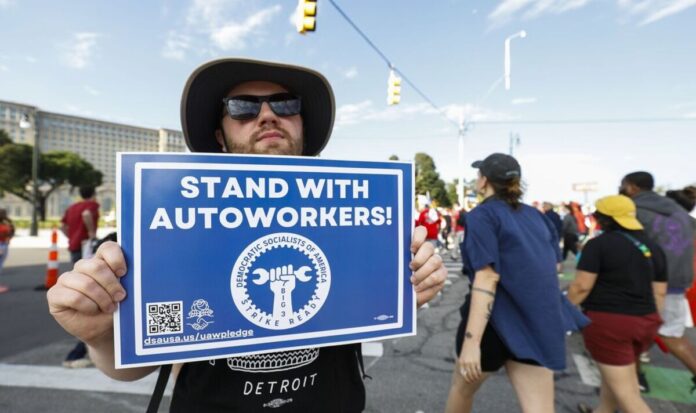UAW workers on Labor Day (Image: Getty) Workers at the “Big Three” in the United States motor manufacturing sector have gone on strike as part of a pay dispute. The United Autoworkers Union says work has stopped at the three plants owned by General Motors, Ford and Stellantis. It comes as a number of labour contracts reportedly expired on Thursday night. According to the BBC , the UAW said neither of the three companies had submitted acceptable offers. The dispute threatens more expensive prices for buyers and major disruption for the firms. The strike started at GM’s mid-sized truck plant in Wentzville as well as Ford’s Bronco plant in Michigan, the Toledo Jeep plant owned by Stellantis. The plants are said to produce some of the Big Three’s most profitable vehicles. “For the first time in our history we will strike all three of the Big Three,” the UAW’s president Shawn Fain said. Ford told the BBC the UAW presented its first “substantive” counterproposal a few hours from the expiration of the current agreement. A spokesman said: “Unfortunately, the UAW’s counterproposal tonight showed little movement from the union’s initial demands.” The union was seeking a 40% pay increase for around 140,000 members over four years. Other demands included a four-day working week, the return of automatic pay increases tied to inflation, and stricter limits on how long a member of staff can be considered temporary. the return of automatic pay increases tied to inflation UAW members on Labor Day (Image: Getty) Talks between the two sides began in July. As of Wednesday, the three firms had upped their initial offers, with Ford offering a 20% hike in pay, GM offering 18%, and Stellantis, the owner of Jeep and Chrysler, 17.5%, reported the BBC . Workers however say the companies can pay more. A 10-day strike by all workers at the three firms could cost the car companies nearly $1bn (£800m) and workers nearly $900m in lost wages, according to estimates by the Anderson Economic Group. Should the strikes spread, it is thought it could cost the economy $5 billion. GM CEO Mary Barra told workers in a letter Thursday that the company is offering historic wage increases and new vehicle commitments at U.S. factories. GM’s offer, she wrote, ‘addresses what you’ve told us is most important to you, in spite of the heated rhetoric from UAW leadership.’
5 September, Thursday, 2024


